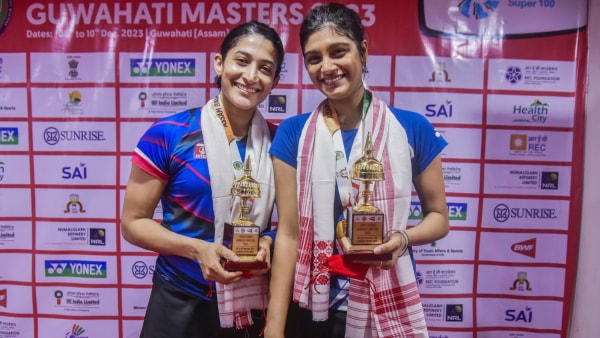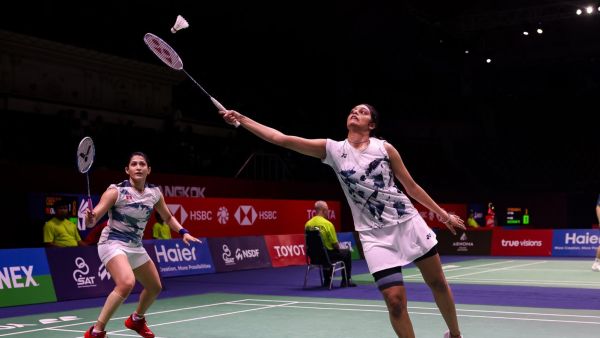
Ashwini Ponnappa won India’s first World Championships bronze of the ongoing streak since Prakash Padukone, at London 2011 alongside Jwala Gutta. She also won India’s first badminton gold at the 2010 Commonwealth Games, helping the home contingent tie England in medals tally and eventually go past them at Delhi. Ashwini played every single day of the 2018 Commonwealth Games, sometimes two matches a day in mixed and doubles, to secure a team event gold for India, for the very first time.
She has never really asked for support – neither financial, nor emotional – and was even deprived of a women’s doubles specialist coach, because she and Tanisha Crasto weren’t considered medal-material at Paris. No, not even a small nudge to the press, a little note through a helpful PR or a message hinting at this, though it was to be her last outing at 34 and she and the debutant Tanisha, could’ve done with lots of help.
Coach Arun Vishnu couldn’t be included in a tightly allotted support staff contingent for badminton, where bigger names needed accommodation. Mathias Boe didn’t have it on his contract that he was to help the women’s doubles, and Pullela Gopichand, as national coach, tried all that he could, but there were no wins to show for the lowly ranked pairing in a tough group. It all finished very quickly for the two women, and Ashwini’s third Olympics ended in stoically held back tears, a gulped pause, before she received the last serve.
 India’s Ashwini Ponnappa and Tanisha Crasto pose for photos after winning the gold medal in the women’s doubles final badminton event against Chinese Taipei’s Sung Shuo Yun and Yu Chien Hui at the Guwahati Masters 2023, in Guwahati, Sunday, Dec. 10, 2023. (PTI Photo)
India’s Ashwini Ponnappa and Tanisha Crasto pose for photos after winning the gold medal in the women’s doubles final badminton event against Chinese Taipei’s Sung Shuo Yun and Yu Chien Hui at the Guwahati Masters 2023, in Guwahati, Sunday, Dec. 10, 2023. (PTI Photo)
Her 20 years of many pioneering firsts, and plenty other defeats in a country that has no legacy of excellence in women’s doubles before Jwala, ended in three clinical losses. What Ashwini did not deserve post her return was trolls downright insulting her, knowing nothing about her struggles to even qualify, and compete against the best Koreans and Japanese in the world without her regular coach who ran the plays at training in Hyderabad. She was targeted only because she clarified that she hadn’t gobbled up some 1.48 crores in training expenses that the screenshotters were throwing at her account.
Ashwini made it to the Olympics, qualifying by travelling for large part by spending from her pockets, and was included in TOPS only after they were locked in for Paris. The ACTC funds were spent not solely on her, but everyone at the national camp, and she was perfectly justified in clearing the air when vile comments which she’s been quietly ignoring, actually took the form of a misinformed news report on the money spent on her.
Selfless, stoic
The Coorgi has maintained unreal fitness standards for all these years, refurnished her game style to suit partners, and not once blamed partners for an error on court. Once the hardest hitter of the smash on court, she put her head down to play the all court rally game, so she could share the burden of her partners in rotations. She had a good partnership going with Satwiksairaj Rankireddy in mixed doubles for which she was better suited, but did not flinch once to allow Satwik to focus on men’s doubles, ending her own mixed career.
Singularly selfless, and figuring out a lot for themselves on the way, never cribbing, Ashwini finally and politely lost her temper when she was trolled for not winning a single match at Paris, with a large money-figure lumped against her name unfactually. Many have returned from the Olympics without winning – we are Indians, remember? But seldom has anyone been insulted by anonymous social media accounts, in such thoughtless fashion.
 Ashwini Ponnappa and Tanisha Crasto reached their first Super 500 semifinal. (BAI)
Ashwini Ponnappa and Tanisha Crasto reached their first Super 500 semifinal. (BAI)
When partnering Sikki Reddy, the duo regularly copped condescending reactions after a loss, and both learnt to gulp down insults with Indian athletes never protected from cyber bullies. An absolutely classy individual, tad introverted and not fond of confrontation, Ashwini kept chipping away at the game, getting better at it, managing painful injuries and no recovery support when she was out of the funding bracket, hoping not for encouragement but at least a modicum of respect for being good enough to qualify for Olympics.
If it has escaped Indian people’s comprehension, the country won only 6 medals, and aren’t exactly teeming with gold talent, for Olympics window shoppers, to fulminate over matches not won. We are not that great also to start insulting a player for not winning.
Ashwini Ponnappa has lived for extended periods away from her husband and her family in Bangalore, just so she could train in Hyderabad. She has endured pain, pushing herself in training, and at the very end quietly accepted without ruckusing that her specialised coach wouldn’t even be courtside, because the medal was tough. Ashwini-Tanisha didn’t quite have NGOs lobbying for their requests, nor a federation with enough clout to fight their corner. Arun Vishnu isn’t paid even a third of foreign coaches, though he’s worked regularly with Treesa Jolly-Gayatri Gopichand and Ashwini-Tanisha this last year.
At Paris, the badminton coaches were 8 to a 700 Sq ft apartment, as Boe told the Bridge, much like all others, and food wasn’t exactly great. These were difficult Olympics for everyone, the sorts that ended with Boe fed up of coaching altogether needing a breather, and Ashwini bravely holding back tears on the court, unable to keep it all in because the journey to make it to Paris, and over that week, had been so darned difficult.
Badminton finished with no medals. But there was absolutely no reason whatsoever for the mild-mannered, soft-spoken Ashwini to cop the vitriol, only because she pointed out to Prakash Padukone that some shuttlers like her hadn’t exactly got all the support.
She has punched above India’s weight all her playing life, won many, lost many too. A resilient player who loved smashing the shuttle to pulp once upon a time but wasn’t naturally outspoken as Jwala was, calmer in resolving conflicts, was left sobbing at the Olympics because she felt she had let herself down. She loves badminton, but the sport and Olympics cruelly made her cry in her final Games outing.
Ashwini really owes no one a win, nor an invoice – if rudeness is what she got for representing India at the Olympics.








